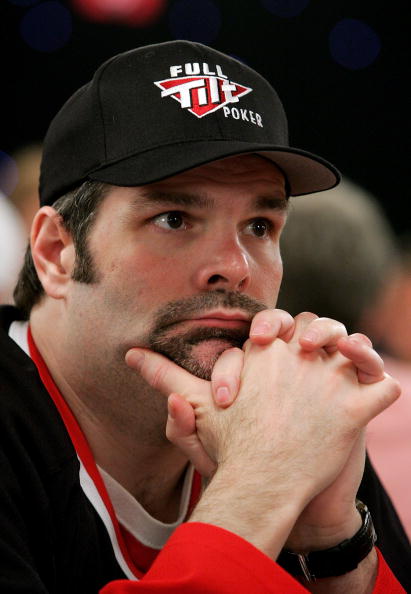What is Howard Lederer's Net Worth?
Howard Lederer is a former professional poker player, author, and businessman who has a net worth of $30 million. Howard Lederer rose to prominence in the early 2000s as one of the key figures in televised poker and online gaming. Known as "The Professor" for his cerebral approach to the game, Lederer was instrumental in popularizing Texas Hold'em during the poker boom and helped build Full Tilt Poker into one of the most dominant online poker platforms of its time. He earned millions in tournament winnings, appeared regularly on poker TV shows, and was widely respected for his deep strategic insight. However, his legacy was forever altered by his role in the Full Tilt Poker scandal, which led to a landmark lawsuit by the U.S. Department of Justice. Although Lederer was never criminally charged, his reputation in the poker world suffered a dramatic fall, and he has largely retreated from the public eye.
Poker Winnings
Howard Lederer was a formidable presence at the poker table throughout the late 1990s and early 2000s. He won two World Series of Poker (WSOP) bracelets and made multiple final table appearances in both WSOP and World Poker Tour (WPT) events. Over the course of his career, he earned more than $5.7 million in live tournament winnings, including over $1.6 million at the WSOP. Lederer became a regular face on poker TV programs like Poker After Dark, High Stakes Poker, and Late Night Poker, where his analytical playing style and calm demeanor earned him both respect and notoriety. He also played an active role in poker education, producing instructional materials and co-founding the Full Tilt Poker Academy to train new players.
Full Tilt Poker
In the early 2000s, as online poker began exploding in popularity, Howard Lederer became one of the co-founders and most visible public faces of Full Tilt Poker. Launched in 2004, Full Tilt quickly became one of the leading online poker platforms in the world, rivaled only by PokerStars. The company's unique edge came from its marketing: Full Tilt was promoted as a site built "by the pros, for the pros," and its ownership structure included a roster of high-profile players such as Chris Ferguson, Phil Ivey, and Erik Seidel.
Lederer wasn't just a figurehead—he was deeply involved in the company's operations and served on its board of directors. He also took part in branding efforts, represented the site in televised events, and helped attract other top players to become site ambassadors. Full Tilt Poker became known for offering high-stakes online games, innovative software, and slick marketing campaigns featuring Lederer and other poker celebrities.
At its peak, Full Tilt was processing hundreds of millions in player deposits and was a central pillar of the poker boom that followed Chris Moneymaker's 2003 World Series of Poker win. The site's branding, visibility, and gameplay features helped define an era of online poker. But unbeknownst to the public, Full Tilt's financial management practices would later come under intense scrutiny, ultimately unraveling the empire Lederer helped build.

Ethan Miller/Getty Images
Legal Case and Full Tilt Controversy
Lederer's reputation collapsed after the April 15, 2011 "Black Friday" crackdown, when the U.S. Department of Justice shut down multiple online poker sites, including Full Tilt Poker. In a civil lawsuit filed by the DOJ, Lederer and other Full Tilt board members were accused of defrauding players out of more than $330 million and misrepresenting the financial health of the company. The government claimed that Lederer personally received $44.3 million in distributions between 2007 and 2011, which were used to fund a lavish lifestyle including real estate, retirement accounts, and luxury vehicles.
Although Lederer was never criminally charged, he settled the civil case in December 2012 without admitting wrongdoing. As part of the settlement with the Southern District of New York, he agreed to forfeit significant assets, including:
- His 1965 Shelby Cobra roadster
- Multiple bank accounts and retirement funds
- A property on Kingsclear Court and proceeds from the sale of two other Las Vegas homes
- A civil money-laundering penalty totaling $1.25 million, plus additional deferred payments over three years
Properties including his custom estate on Hawk Ridge Drive were mentioned in earlier complaints but were ultimately not included in the final settlement. The fallout from the case effectively ended Lederer's poker career, and he remained absent from the World Series of Poker for nearly a decade.

(Photo by Mike Adaskaveg/MediaNews Group/Boston Herald via Getty Images)
Real Estate
Lederer's real estate portfolio drew scrutiny during the DOJ investigation due to its luxury and scale. At the height of his Full Tilt Poker earnings, he and his wife Susan owned as many as six homes in Las Vegas, including a sprawling estate in the exclusive Ridges community in Summerlin.
In 2005, he paid $674,000 for a 0.43-acre lot on Hawk Ridge Drive. Three years later, he purchased a neighboring 1.24-acre lot on Skybird Court for $1.095 million. Between 2007 and 2010, Lederer spent over $10.5 million constructing an 8,892-square-foot mansion and a 4,598-square-foot guesthouse across the two parcels. The property boasted high-end amenities such as a state-of-the-art home theater, outdoor speakers that rose from the ground, a wet bar, and an oversized outdoor chessboard.
The estate was first listed in 2013 for $8.9 million, but it lingered on the market for several years before finally selling in March 2021 for $6.15 million. Just two months later, in May 2021, Lederer purchased a new, more modest residence in Las Vegas for $1.1 million, which is believed to be his current home.
/2025/07/Howard-Lederer.png)
/2025/07/Chris-Ferguson.jpg)
/2013/02/rafe.jpg)
/2010/07/Tom-Dwan.jpg)
/2010/07/GettyImages-71554816-e1565883630470.jpg)
/2010/12/Annie-Duke.jpg)
/2020/01/lopez3.jpg)
/2020/04/Megan-Fox.jpg)
/2019/11/GettyImages-1094653148.jpg)
/2009/09/Brad-Pitt.jpg)
/2019/10/denzel-washington-1.jpg)
:strip_exif()/2015/09/GettyImages-476575299.jpg)
/2018/03/GettyImages-821622848.jpg)
/2020/02/Angelina-Jolie.png)
/2009/09/Jennifer-Aniston.jpg)
/2019/04/rr.jpg)
/2020/06/taylor.png)
/2025/07/Howard-Lederer.png)
/2025/07/Chris-Ferguson.jpg)
/2013/02/rafe.jpg)
/2011/09/GettyImages-80064766.jpg)
/2010/07/GettyImages-71554816-e1565883630470.jpg)
/2016/12/Phil-Ivey.jpg)
/2010/07/Tom-Dwan.jpg)
:strip_exif()/2009/09/P-Diddy.jpg)
/2017/02/GettyImages-528215436.jpg)
/2009/09/Cristiano-Ronaldo.jpg)
/2009/11/George-Clooney.jpg)